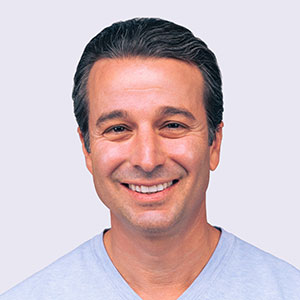
14 Sep Q&A with Lance Baldo, Chief Medical Officer, Adaptive Biotechnologies

Lance Baldo is currently leading the medical strategy for Adaptive Biotechnologies, helping the company realize its bold aspirations for its immune-driven medicine platform. The team is focused on identifying the areas of medicine, both in diagnostics and therapeutics, where disruptive technology may advance outcomes, increase efficiency and/or improve the patient experience. Read his full bio.
Interview with Lance Baldo, Adaptive Biotechnologies
Q: You joined Adaptive Biotechnologies in April as Chief Medical Officer, overseeing translational research and clinical development to help support product development from the immune medicine platform. What are you most excited about?
A: One of the things that excited me most about joining Adaptive Biotechnologies was the use of technology to read and translate the genetics of the human immune system to effect a complete paradigm shift in how diseases could be diagnosed and treated. Our immune medicine platform applies our proprietary technologies, computational biology, software and machine learning to read the diverse genetic code of a patient’s immune system and understand precisely how it detects and treats diseases. Adaptive sits at the crossroads of biotech and tech, and I’m very excited to be part of this next frontier in health and medicine.
Q: immunoSEQ research service and kits are used to answer translational research questions and discover new. Can you please give us an example of a recently published study that involves immunoSEQ?
A: immunoSEQ is the core technology of our immune medicine platform. It’s a proprietary immunosequencing technology that can quantitatively sequence millions of T- and B-cell receptors in the immune system at scale and with precision. Since its launch in 2010, immunoSEQ has been used by over 2,000 academic researchers and 125 biopharma companies in over 480 clinical trials to empower the discovery of new biomarkers in cancer and other immune-mediated diseases.
As an example of the potentially transformative potential of immunoSEQ, we recently published a paper in Cell Reports with our collaborators at the University of Hamburg in Germany investigating the immune response in multiple sclerosis (MS). Many autoimmune diseases, including MS, show lower activity during pregnancy. In this study, the researchers were provided the unique opportunity to study the T-cell responses throughout pregnancy in women with MS. They were able to track the T-cell clones that decreased from the 1st to 3rd trimester and then expanded postpartum. This is very exciting, as it may pinpoint the exact immune cells driving MS in these women. Research data like those generated in this paper could potentially be used to discover and develop treatments that could someday power patient care.
Q: How do blood cancer patients benefit from the introduction of clonoSEQ into clinical management?
A: As cancer treatments continue to improve in the field of hematology, patients are living longer. This has created a need for highly sensitive, standardized tools to monitor a patient’s cancer cells or minimal residual disease (MRD). Our clonoSEQ Assay is the first and only FDA-authorized diagnostic test to detect and monitor very low levels of remaining cancer or MRD using bone marrow from patients with multiple myeloma or B-cell acute lymphoblastic leukemia.
clonoSEQ MRD testing provides clinicians with a more complete clinical picture so that they can be as informed as possible about what is happening with their patient’s disease at a molecular level. By incorporating clonoSEQ into routine clinical practice to monitor MRD status, clinicians can see how effective treatment has been or see if a patient has gone into remission or relapsed. A patient’s MRD status can then be used to determine the optimal management approach for each patient.
MRD assessment has also become a significant focus in oncology product clinical development. In fact, we announced a new partnership with Amgen in September to use our clonoSEQ Assay in ongoing and future clinical trials within its global blood cancer portfolio.
Q: Adaptive is mapping the immune system and developing immunoSEQ Dx as an early stage diagnostic. What is the product vision for immunoSEQ Dx and how could that change the way diseases are diagnosed?
A: In partnership with Microsoft, we are engaged in a first-of-its-kind undertaking to map the millions of T-cell receptors (TCR) in our immune system to the thousands of disease-related antigens that they detect and treat. The TCR-Antigen Map is generating data that we are using to develop our second clinical diagnostics product immunoSEQ Dx. We believe it will enable the early and accurate diagnosis of many diseases at the same time by reading the genetics of the adaptive immune system. We envision a future where the doctor can get a clear picture of what a patient’s immune system is seeing from a single blood test.
We already have two early clinical signals. We expect to confirm at least one of these clinical signals by the end of 2019 and initiate a clinical validation study in 2020 with a goal to have a clinical product in 2021.
Q: TruTCR is the technology from your immune medicine platform that underpins your work in cellular therapy drug discovery. Can you describe TruTCR and how you are leveraging it for the development of cellular therapies in oncology?
A: The same technology that we use to connect TCRs to antigens to make the TCR-Antigen Map is also used to discover TCRs for therapeutic use in cancer, autoimmune conditions and infectious disease. Over the last few years, we have built a robust discovery and screening technology called TruTCR to identify TCRs that map to cancer-related antigens and then funnel them down to the ones that enable strong binding, target killing, and may have minimal off-target effects. To date, we’ve characterized more than 1,200 antigen-specific TCRs against 600 clinically relevant cancer antigens.
In January, we announced that Genentech selected our TCR discovery and screening technology to lead their foray into cellular therapy in oncology. We are developing “shared” cellular therapies against prioritized target cancer antigens that are shared between patients. We are currently completing data packages for this first set of TCRs. These will be evaluated by Genentech, and we expect one or more of these TCRs will be selected for inclusion in the first shared product IND filing.
In addition, we are also working in parallel to develop a personalized cellular therapy where we plan to identify in real-time the TCRs that are specific to each patient’s tumor. The goal is to design and manufacture a unique therapy for each patient that targets that patient’s unique and individual cancer mutations. We are on track for the product prototype and we are currently working together with Genentech to enable a one-month vein-to-vein time for this personalized prototype to be tested in the clinic. With this partnership underway, we are excited about the future potential of delivering truly personalized medicine to patients.






